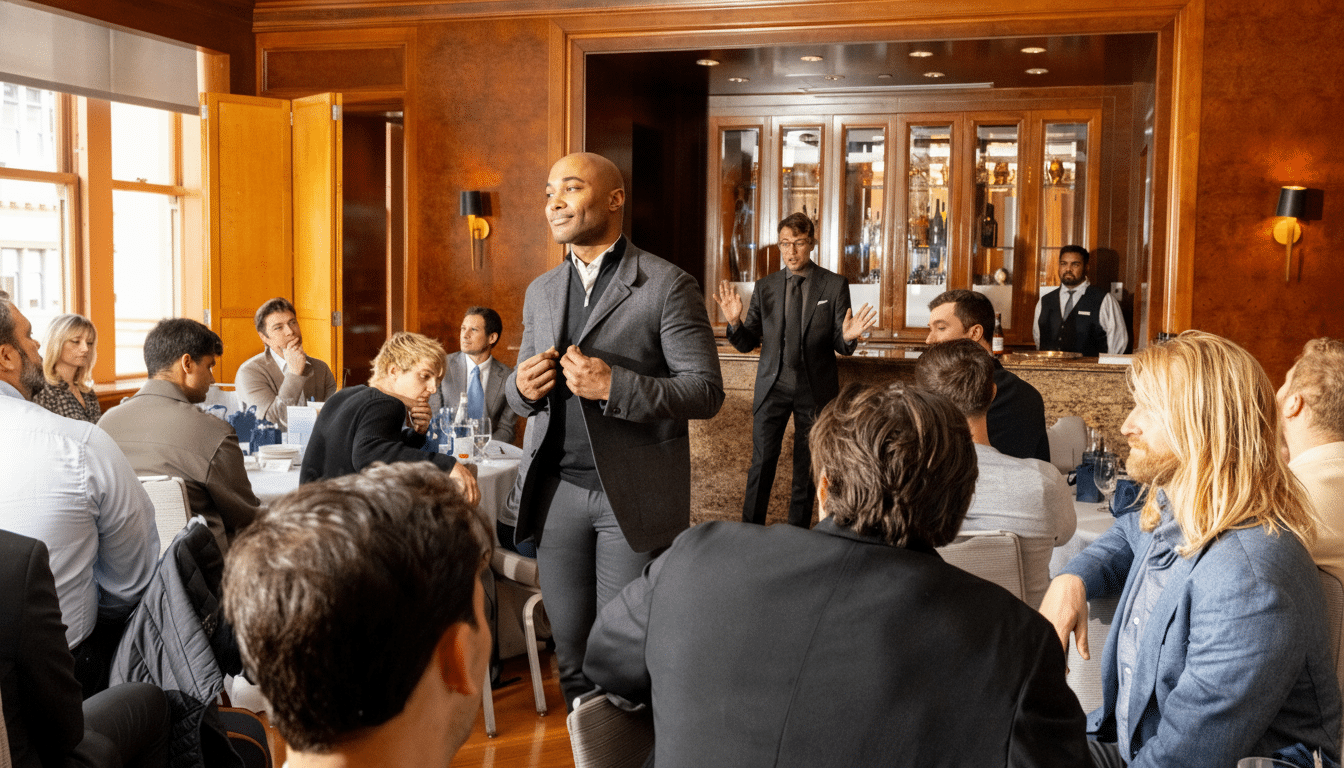Slow Ventures is embracing startup polish, with a three-hour etiquette “finishing school” for founders hosted at the Four Seasons in San Francisco’s financial district. In the workshop were lessons on how to shake hands confidently, practice public speaking and navigate office etiquette, runway presentations of looks that work for various professional scenarios as well as a primer on how to taste caviar (and wine) so as not to flub investor dinners.
The free program drew applications from a couple of hundred founders, with 50 accepted, The San Francisco Standard reported. Most attendees were men. A high-profile concept that started as a joke bandied around Y Combinator’s Demo Day, and underwritten by exceedingly serious interest (one of the first indications that Silicon Valley is shifting from hoodies-and-hustle to rooms full of hard currency where perception carries a megaton weight).

Why A Venture Firm Is Giving Founders Etiquette Lessons
“Tech is no longer for kids and it’s not anymore playful and cute,” Slow Ventures general partner Sam Lessin, an onstage Lantern editor-at-large, pointed out in his opening remarks before the audience of tech professionals as AI and automation start to redefine jobs and environments. “People are really chugging on espresso; there’s nothing fun about this industry.” In that environment, he said, founders should project respect and dependability in public rather than aiming to be deliberately edgy. The lesson here: polish isn’t jot and tittle; it’s risk management when you have any number of customers, policymakers and the general public in the audience.
The timing is in sync with a broader reckoning. The Edelman Trust Barometer has tracked a decline in public trust of technology leaders, while enterprise buyers and regulators have increasingly been peeking under the hood of AI deployments. Research by the Center for Talent Innovation, as publicized in works like Sylvia Ann Hewlett’s, links promotion results to “executive presence,” which it estimates makes up 26 percent of what one perceives as one’s path to success. For founders, that can mean a practical advantage when pitching, hiring and negotiating.
Inside the curriculum for Slow Ventures’ founder etiquette
Its blocks were intentionally tactile for the session. Handshake coaching that centered on posture, eye contact and a firm but not overbearing grip — how these little signals could dictate the feeling of investor or client meetings. There were exercises on pacing, cold opens and 30-second persuasive arcs, feedback on filler words and presence. Office etiquette training included introductions, passing off meetings and respectful interrupting.
One fashion segment demonstrated what “board-ready” looks like in different situations across all contexts — enterprise sales calls, all-hands meetings, policy briefings and black-tie galas; models who looked only too real also showed how to dial formality up or down. The night ended with a tasting of caviar and wine designed to demystify the sort of high-end dining rituals that can paralyze first-time founders at industry events.

The program was free, an unusual decision for a venture firm that frequently encounters founders who are product-savvy but not customer-oriented. One attendee told the Standard they attended to “become less feral,” a brutally honest admission that startup culture’s celebrated informality can curdle into well-meaning but avoidable faux pas once your audience broadens beyond early adopters.
Community reaction and debate over founder finishing school
The Y Combinator CEO, Garry Tan, reportedly told its founders not to show up; then he backtracked a bit on Twitter, saying “I personally have no beef with Slow Ventures” while reiterating the canonical YC doctrine: build something great, make users happy and hone craft. The pushback reflects an age-old tension in tech between substance and sheen — all the more pronounced now that founders are briefing regulators, courting Fortune 500 customers and addressing skeptical communities.
The cohort was somewhat male-tilted, reflecting a larger imbalance. PitchBook has repeatedly demonstrated that all-women founding teams get less than 3% of US venture money. Finishing schools run the risk of simply ossifying old norms if they cater primarily to those already in the room; a more interesting test is whether programs like this actually open up access by translating unwritten rules for underrepresented founders.
A signal from a maturing startup culture and market
Etiquette and presence training are not groundbreaking in the corporate world — Fortune 500 leadership programs and the famed Interpersonal Dynamics course at the Stanford Graduate School of Business emphasize soft power. What’s different now is the encroachment of these forces into early-stage startup life. As AI startups court regulated industries and global partners, being polished is more and more a part of the job description.
Whether a Slow Ventures-style finishing school takes off will depend on results. And if alumni forge better enterprise deals, poach more experienced executives and avoid public blunders, firms will copy the playbook. But the lesson isn’t either-or. As Tan’s and Lessin’s divergent stripes suggest, that combination is now a requirement for founders: Unequivocal products and a trustworthy presence capable of shepherding those products into crucible, high-stakes rooms.

